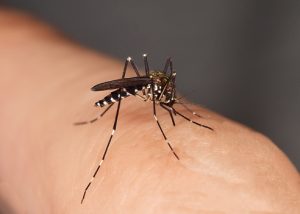 West Nile Virus is a virus that spreads through mosquito bites. Named after the West Nile district of Uganda where it was first identified, the virus can be found in many parts of the world, including North America, Europe, Africa, the Middle East, Asia, and Australia.
West Nile Virus is a virus that spreads through mosquito bites. Named after the West Nile district of Uganda where it was first identified, the virus can be found in many parts of the world, including North America, Europe, Africa, the Middle East, Asia, and Australia.
West Nile Virus is the most common mosquito-transmitted virus in the U.S., with cases reported in 49 states. There have been over 51,000 symptomatic cases in the U.S. since the first cases in the country were discovered by the late Dr. Deborah Asnis here at Flushing Hospital Medical Center in 1999.
The symptoms of West Nile virus include:
- Fever
- Headache
- Muscle aches
- Nausea and vomiting
- Diarrhea
- A rash that is concentrated around the chest and back
- Swollen lymph nodes
- Sore throat
- Pain behind the eyes
West Nile virus can cause serious infections like encephalitis and meningitis. Their symptoms include:
- An intense, painful headache
- A high fever above 103 degrees
- A stiff neck
- Confusion
- Muscle weakness
- Uncontrollable muscle movements such as tremors and convulsions
- Seizures
- Paralysis
- Coma
West Nile virus can be diagnosed by testing your blood or cerebrospinal fluid to look for antibodies or other signs of infection. These tests are only performed if you’re seriously ill.
If you have signs of brain inflammation, you will need your brain scanned using a CT scan or MRI.
There are no specific medicines available to treat West Nile virus. Please note that antibiotics do not treat viruses.
Rest, fluids, and over-the-counter medications may relieve some symptoms. In severe cases, patients often need to be hospitalized to receive supportive treatment, such as intravenous fluids, pain medication, and nursing care.
If you become sick with severe symptoms, particularly after potential exposure to West Nile virus, you must receive treatment from a doctor as soon as possible. You can schedule an appointment at Flushing Hospital Medical Center’s Ambulatory Care Center by calling (718) 670-5486.
All content of this newsletter is intended for general information purposes only and is not intended or implied to be a substitute for professional medical advice, diagnosis or treatment. Please consult a medical professional before adopting any of the suggestions on this page. You must never disregard professional medical advice or delay seeking medical treatment based upon any content of this newsletter. PROMPTLY CONSULT YOUR PHYSICIAN OR CALL 911 IF YOU BELIEVE YOU HAVE A MEDICAL EMERGENCY.

